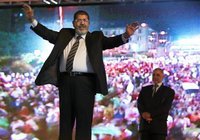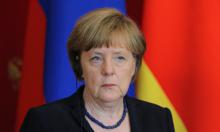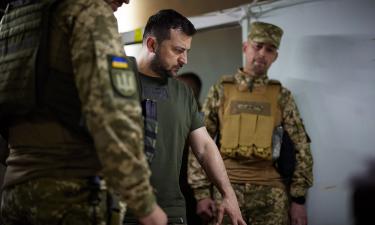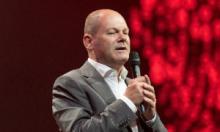Egyptian Islamists ready to take power in their hands
Pre-election excitement is running high in Egypt. The first round of presidential elections has not revealed the winner. Out of the 13 presidential candidates, the maximum number of votes was obtained by head of "Party of Freedom and Justice" Mohammed Mursi - 28 percent of the vote, in second place is ex-Prime Minister Ahmed Shafiq with 21 percent of the vote. In the second round they will have a decisive battle for the presidency.

The candidate from the movement of "Muslim Brotherhood" Mohammed Mursi has a good chance of winning as today his party holds a strong position in the parliament and has a steady popularity, especially in rural areas. Islamists have been carrying out painstaking work here for decades to strengthen their position as they were betting on solving urgent problems of the local population.
In this regard it is worth mentioning that the movement was created by a rural schoolteacher Hassan al-Banna in 1928. After the overthrow of Mubarak, "Muslim Brotherhood" continues to implement various social measures, including, in particular, opening up markets for trade in fruits and vegetables at reduced prices. Thanks to the sponsorship of Saudi Arabia and Qatar, the party launched a strong campaign, accompanied by populist slogans. If the "Muslim Brotherhood" wins the presidential election, all power will be in their hands, and creation of an Islamic state may become a reality later this year,
As a result of the November parliamentary elections, the party Islamist scored a total of about 60 percent of the vote. Salafis started passing through the Parliament legislation aimed at establishing strict religious norms in the society. In December of 2011 they proposed, in particular, to introduce the so-called "tax on infidels" - jizya, which existed in Egypt for many centuries and was abolished only in the 19th century.
In later March establishment of a new Constitution was placed on the agenda. Significant differences between Islamists and liberals emerged during the discussion of the Constitutional Council. Copts found themselves in the minority, and chose not to participate in the council, composed of Salafi supporters and "Muslim Brotherhood". As a result, the administrative court in Cairo on April 10 of 2012 suspended the decision on the formation of Egypt's Constitutional Council that was entrusted with the task of writing the fundamental law of the country, said Israeli portal News. ru.co.il.
On the eve of the parliamentary elections anxiety began to grow in the Egyptian society in regard with a possible rise of Islamists to power, who have openly declared a policy of introducing Sharia. The greatest concern was expressed by the Coptic Christians living in Egypt for 14 centuries.
By the beginning of the 20thcentury the total number of Christian communities in the country amounted to a little over eight million people - about 10 percent of the total population. In 2011, during the riots, dozens of people were killed by the extremists and the military. The protest of Christian Copts in Cairo held on October 4, 2011 was brutally suppressed by the authorities who used military equipment against unarmed people.
As the European media reported, on May 23-24 of 2012 Copts have taken an active part in the first round of voting in the presidential elections in Egypt. Most of them voted for the independent candidate Hamdeen Sabahy, who took third place with twenty percent of the vote. It turns out that such an arrangement was not quite satisfactory for the socialist candidate claiming victory in the first round.
Without waiting for the official announcement of the election results, Sabahy delivered a list of violations that have affected the vote, demanding the consideration of the Electoral Commission. He mentioned the unacceptable cases of theft and "purchase" of votes by the "Muslim Brotherhood". However, most observers have noted that the violations in the first round of voting were not widespread. According to the Egyptian Association to support the development of democracy, no serious fraud was reported.
The current elections in Egypt are also affected by social networks. Here, the debate is unfolding between the adherents of the Islamic movement and their opponents, supporters of a pro-secular way of the development of the state. There is an open war with the "Muslim Brotherhood" on "Facebook."
However, the outcome of the second round of the presidential elections scheduled for June 16-17 will largely depend on those who would get the votes of the liberal nationalist Hamdeen Sabahy and Islamist Abol Fotouh. It is possible that the majority of Sabahy's supporters, including many Christians, the Copts, will vote for Ahmed Shafiq to rule out the possibility of coming to power of Islamic radicals. Under these circumstances, Mohammed Mursi can count on the support of those voters who voted for the independent candidate from the Islamists Fotouh.
Shortly after the first round of elections Mohammed Mursi held talks with those candidates who, in his opinion, can "give" him their votes in order to prevent the coming to power of the representative of the "old guard" Ahmed Shafiq. The islamists on the eve of the second round are trying to scare the population with the attempts to restore a dictatorial regime, which, in their opinion, will certainly happen if the former Prime Minister Shafiq is able to win.
In any case, the situation in post-revolutionary Egypt has finally calmed down before the first presidential elections. There is little doubt that the second round will be held in June, when the voters will have the opportunity to choose between the military junta and the Islamists. However, the election of the president does not guarantee political stability in the coming years.
Analysts have repeatedly expressed concerns about the possible intensification of the confrontation between the ruling junta and the revolutionaries, acting for a radical revision of the constitutional norms and the establishment of an Islamic state. The fate of the country will be decided by July 1, when Egypt's Supreme Military Council must give full power to an elected president and the parliament.
Yuri Sosinsky-Semikhat
Pravda.Ru
Subscribe to Pravda.Ru Telegram channel, Facebook, RSS!





